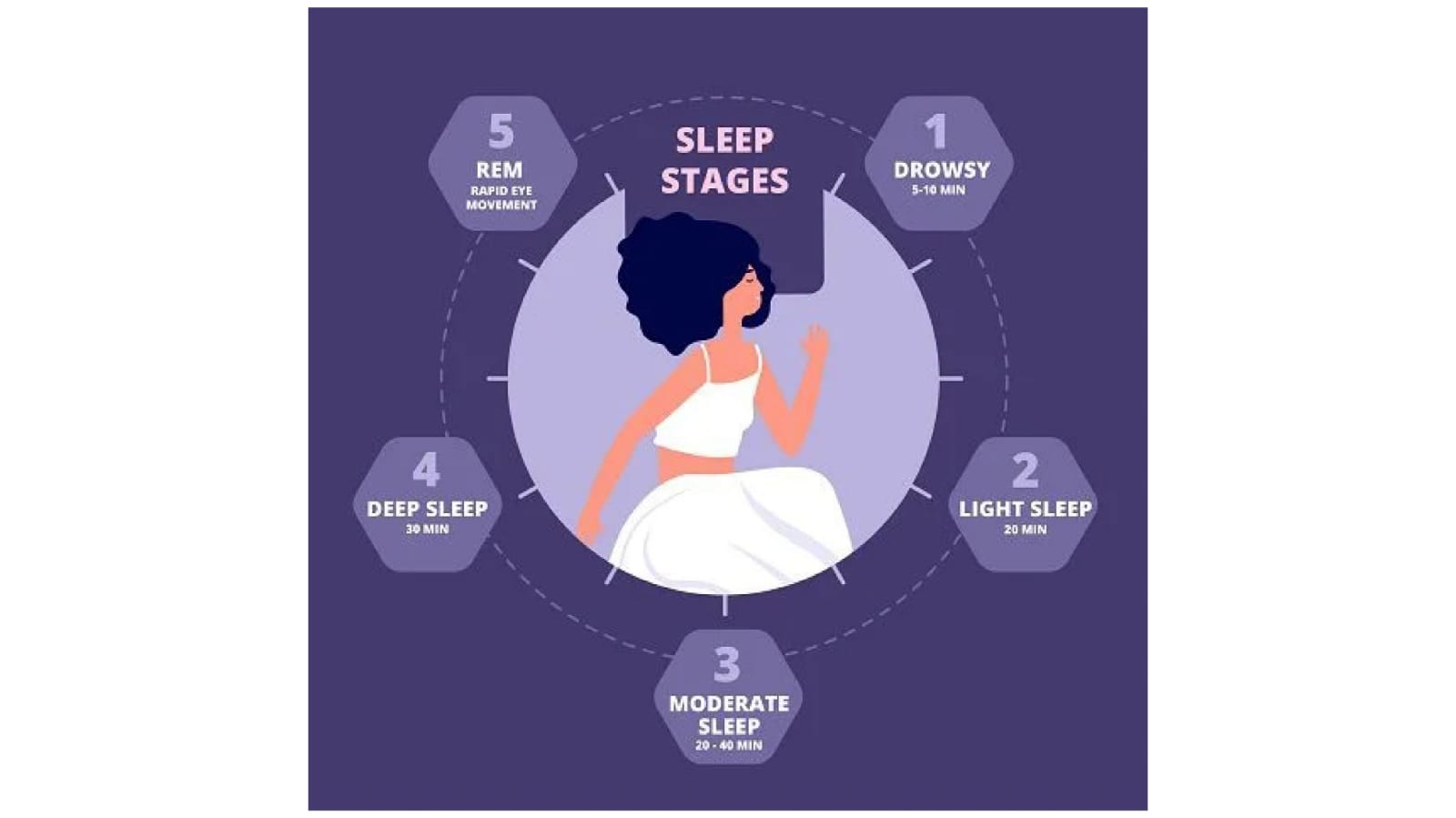The Basics of Sleep
Before we discuss our common queries, let's understand the basics of sleep. Sleep is a natural and recurring state of rest for the body and mind. It is a complex process that occurs in several stages, including non-REM (rapid eye movement) and REM sleep. These stages play a crucial role in restoring and rejuvenating our body and mind.
Sleep is a fundamental necessity in our lives, influencing various aspects of our physical and mental health. The intriguing world of sleep patterns, encompassing factors like duration, quality, and timing, holds the key to our overall well-being. In this article, we will delve into the intricate web of sleep patterns and explore their multifaceted impact on our health and daily lives.
Now enough of heavy knowledge let go straight to the most common questions
1. Can Sleep Patterns Trigger Migraines?
Migraines, those throbbing headaches that haunt us, can be set in motion or intensified by our sleep patterns. Irregular sleep hours, insufficient sleep, or erratic schedules can act as triggers, making migraines more frequent and intense for some individuals.
2. Can Your Sleep Patterns Affect Hair Loss?
The connection between sleep patterns and hair loss may not be direct, but it's undeniably there. Chronic sleep deprivation can fuel stress and hormonal imbalances, which can indirectly contribute to hair loss. Prioritizing healthy sleep habits can help you manage stress and potentially curb hair loss concerns.
3. The Weighty Impact of Sleep Patterns
Yes, sleep patterns significantly impact weight management. Disrupted sleep can wreak havoc on the body's hunger-regulating hormones, leading to increased cravings and a greater risk of weight gain. Moreover, inadequate sleep can slow down your metabolism, making it more challenging to shed those extra pounds.
4. How do Sleep Patterns Evolve with Age?
As we journey through life, our sleep patterns evolve. Ageing brings changes in the duration and structure of our sleep. Older adults often experience lighter sleep, more nighttime awakenings, and a shift towards an earlier bedtime and wake time.
5. Sleep's Influence on Your Menstrual Cycle
Surprisingly, sleep patterns can sway the rhythm of your menstrual cycle. Irregular sleep, disturbances during the night, or consistent sleep deprivation can disrupt your hormonal balance, potentially leading to irregular or painful periods.
6. Can Bad Sleep Habits Lead to Acne?
Though not a direct cause, poor sleep can certainly exacerbate skin issues like acne. Sleep deprivation can ramp up stress levels, which may trigger or worsen skin conditions. Additionally, insufficient sleep can hinder your body's natural healing processes, affecting skin health.
7. The Emotional Rollercoaster: How Sleep Patterns Affect Depression
The relationship between sleep patterns and depression is intricate. Depression can manifest as insomnia or excessive sleep, while chronic sleep problems can intensify depressive symptoms. Addressing sleep disturbances often plays a crucial role in managing depression effectively.
In Conclusion, Sleep patterns are not just routines; they act as a big gun for our well-being. Their influence extends to various aspects of our lives, from migraines and hair loss to weight management, ageing, menstrual cycles, skin health, and mental well-being. Recognizing the significance of healthy sleep habits and addressing sleep-related issues is pivotal to achieving a balanced and fulfilling life. To optimize your health and overall well-being, consider making quality sleep a priority and seek professional guidance when needed. Your path to better health might just start with a good night's sleep
http://www.21stcenturyhospitalgownplus.com/
http://www.elite-factory-15.fr/
http://www.gba-amateurboxen.de/
http://www.kita-strausberg.de/
http://sonispicehelensburgh.co.uk/
http://curryzonecardonald.co.uk/
http://cinnamon-edinburgh.co.uk/
http://www.bombaydelipaisley.com/
http://pizzanightclydebank.co.uk/
http://www.pizzanightclydebank.com/
http://gyros2goclydebank.co.uk/
http://grillicious-glasgow.co.uk/
http://www.abdulstakeaway.com/
http://www.freddiesfoodclub.com/
http://cinnamonportobello.co.uk/
http://www.romafishnchips.com/
http://bombaydelipaisley.co.uk/
http://yaraloungerestaurant.co.uk/
http://tasteofchinacoatbridge.co.uk/
http://www.memoriesofindiagorebridge.com/
http://memoriesofindiaeh23.co.uk/
http://freddiesknightswood.co.uk/
http://gyros2gohardgate.co.uk/
http://www.strausseeschwimmen.de/
http://www.janstanislawwojciechowski.pl/
http://london-takeaways.co.uk/
http://shahimanziledinburgh.co.uk/
http://freddiesfoodclub.co.uk/
http://www.spicestakeaway.com/
http://www.mexita-paisley.com/
http://pandahouseglasgow.co.uk/
http://www.zum-alten-steuerhaus.de/
http://www.oberstufenzentrum-mol.org/
http://www.morsteins-neuenhagen.de/
http://www.maerkische-jugendweihe.de/
http://www.planungsbuero-henschel.de/
http://www.hertzelektronik.de/
http://www.militaergefaengnisschwedt.de/
http://www.fahrrad-naumann.de/
http://www.hondamoto-villemomble.com/
http://www.hondamoto-royan.com/
http://www.hondamoto-ajaccio.com/
http://www.download-skycs.com/
http://www.sisakoskameleon.hu/
http://www.hondamoto-montauban.com/
http://www.hondamoto-chalonsursaone.com/
http://www.hondamoto-champignysurmarne.com/
http://www.hondamoto-asnieres.com/
http://www.pasquier-motos.com/
http://www.evacollegeofayurved.com/
http://www.compro-oro-italia.it/
http://www.hondamoto-saintmaximin.com/
http://www.hoangminhceramics.com/
http://www.pasiekaambrozja.pl/
http://www.xn--b1alildct.xn--p1ai/
http://www.ferreteriaflorencia.com/
http://www.thevichotelkisumu.com/
http://www.nexuscollection.com/
http://www.moitruongminhhuy.com/
http://www.ozkayalarpaslanmaz.com/
http://www.munkagepmonitor.hu/
http://www.my247webhosting.com/
http://www.thesmokingribs.com/
http://www.healthlabgrosseto.it/
http://www.ochranakaroserie.cz/
http://www.phukiendonginox.com/
http://www.meijersautomotive.nl/
http://www.kartaestudentit.al/
http://www.podlahyjihlavsko.cz/
http://www.hillhouseequestrian.com/
http://www.gradskapivnicacitadela.com/
http://www.capella-amadeus.de/
http://www.landfleischerei-auris.de/
http://www.faistesvacances.be/
http://www.autoservice-doernbrack.de/
http://www.tabakhaus-durek.de/
http://www.oldtimer-strausberg.de/
http://www.imexsocarauctions.com/
http://www.kaslikworkshop.com/
http://www.firefightercpr.com/
http://www.visuallearningsys.com/
http://www.hanksautowreckers.com/
http://www.impresospichardo.com/
http://www.philiphydraulics.net/
http://www.internationaldentalimplantassociation.com/
http://www.indywoodtalenthunt.com/
http://www.badicecreamgame.com/
http://www.riad-amarrakech.com/
http://www.centrodeformacioncanario.com/
http://www.socialdefender.com/
http://www.pepiniere-paravegetal.com/
http://www.reparertelephonearles.fr/
http://www.namsontrongdoi.com/
http://www.devipujakjivansathiseva.in/
http://www.laymissionhelpers.org/
http://www.vangiaphatdeco.com/
http://www.isscoachinglucknow.in/
http://www.hieuchuandoluong.com/
http://www.aurorabienesraices.com/
http://www.indianmoversassociation.com/
http://www.oztopraklarotomotiv.com/
http://moitruongnamnhat.com.vn/
http://www.dienmayvinhthuan.vn/
http://www.divadelkoproskoly.cz/
http://www.xn--12cfje1df4hdl7f1bf2evg9e.com/
http://www.westernirontrailers.com/
http://www.jazzaufildeloise.fr/
http://www.signcraft-drone.com/
http://www.realtyhighvision.com/
http://www.thermexscandinavia.nl/
http://imobiliariafelipe.com.br/
http://www.salon-lindenoase.de/
http://www.jezirka-zahrada.cz/
http://www.singhanialogistics.in/
http://www.der-pixelmischer.de/
http://www.hegermuehlen-grundschule.de/
http://www.radiologie-strausberg.de/
http://www.foto-studio-matte.de/
http://www.tables-multiplication.com/
http://www.rusztowania-belchatow.pl/
http://www.fishingandhuntingheaven.com/
http://www.orologiegioiellilameridiana.it/
http://www.rotarybresciaest.org/
http://www.jacarandaspain.com/
http://www.javieririberri.com/
http://www.huebelschraenzer.ch/
http://www.illinoiscreditunionjobs.com/
http://www.iznikdenizorganizasyon.com/
http://www.leasebackconcierge.com/
http://www.eoisantacoloma.org/
http://skullbasesurgery.co.uk/
http://www.immobilienplattensee.com/
http://www.germandailynews.com/
http://www.gptdcinternational.com/
http://www.forklifttrainingedmonton.com/
http://www.kashiwanakayama-cl.com/
http://www.thehousemediagroup.com/
http://www.pensiimaramures.ro/
http://www.michaelakokesova.cz/
http://www.viswabrahmanaeducationaltrust.com/
http://krone-aluminium.com.pl/
http://www.broadwaylumber.com/
http://www.ambulancesoccasions.com/
http://www.continuumintegrated.com/
http://www.joilifemarketing.com/
http://www.rotaseydisehir.com/

 Hey, night owl or an early pigeon! Ever wondered how your unchained sleep cycle can affect your hair, weight, or mood? Dive into this fun guide of some common and uncommon Q&A that'll help you conquer the world, one cosy night's sleep at a time or an early sunrise at Marine Drive!
Hey, night owl or an early pigeon! Ever wondered how your unchained sleep cycle can affect your hair, weight, or mood? Dive into this fun guide of some common and uncommon Q&A that'll help you conquer the world, one cosy night's sleep at a time or an early sunrise at Marine Drive!









.jpeg)

.jpeg)
.jpeg)
.jpeg)

.jpeg)
.jpeg)
.jpeg)
_(1).jpeg)

_(1)_(1)_(1).jpeg)
.jpeg)
.jpeg)
.jpeg)






